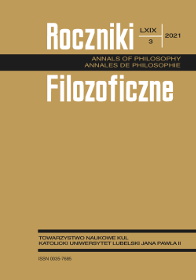Comments for My Colleagues
Abstract
In the paper, the originator of the hiddenness argument, J. L. Schellenberg, responds to papers that challenge his reasoning. In his remarks he puts an emphasis on the concept of divine love and he explains why it is not only connected to the idea of the Christian God. He also clarifies his position on ultimism.
References
Butakov, Pavel. “Divine Openness for Physical Relationship.” Roczniki filozoficzne 69, no. 3 (2021): 141–61.
Cohen, Jonathan. An Essay on Belief and Acceptance. Oxford: Clarendon Press, 1992.
Dobrzeniecki, Marek, and Derek King. “The Theology of Hiddenness: J. L. Schellenberg, Divine Hiddenness, and the Role of Theology.” Roczniki filozoficzne 69, no. 3 (2021): 105–22.
Dumsday, Travis. “From Satan’s Wager to Eve’s Gambit to Our Leap: An Anselmian Reply to the Problem of Divine Hiddenness.” Roczniki filozoficzne 69, no. 3 (2021): 67–85.
Guillon, Jean-Baptiste. “‘You Would Not Seek Me, If You Had Not Found Me’. Another Pascalian response to the problem of Divine Hiddenness.” Roczniki filozoficzne 69, no. 3 (2021): 163–214.
Jordan, Jeff. 2021. “Argument from Divine Hiddenness and Christian Love.” Roczniki filozoficzne 69, no. 3 (2021): 87–103.
Mordarski, Ryszard. “Benevolence or Mercy? The Problem with the First Premise of the Hiddenness Argument.” Roczniki filozoficzne 69, no. 3 (2021): 123–39.
Schellenberg, J. L. The Will to Imagine. A Justification of Skeptical Religion. Ithaca, NY: Cornell University Press, 2009.
Wojtysiak, Jacek. “How to Be a Christian Ultimist? On Three Lessons John L. Schellenberg and the Christian Theist Can Learn from Each Other.” Roczniki filozoficzne 69, no. 3 (2021): 215–29.
Copyright (c) 2021 Roczniki Filozoficzne

This work is licensed under a Creative Commons Attribution-NonCommercial-NoDerivatives 4.0 International License.





